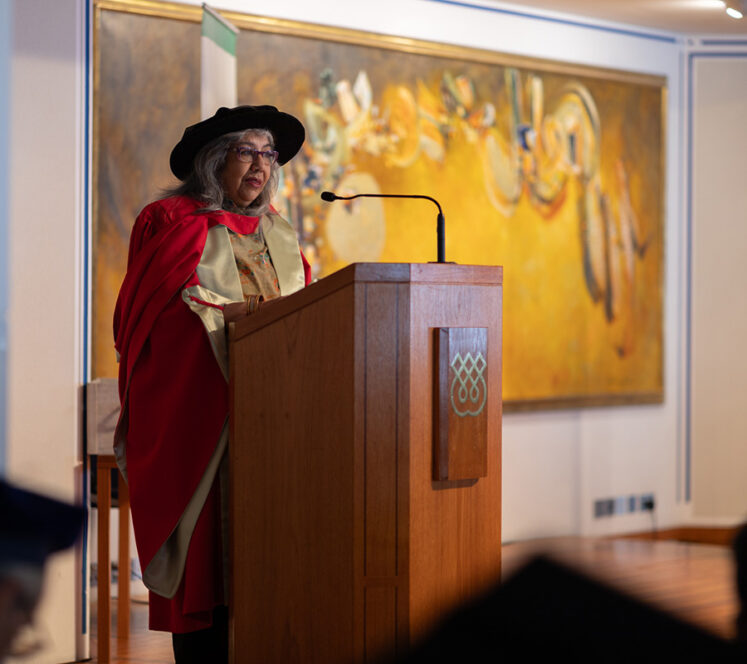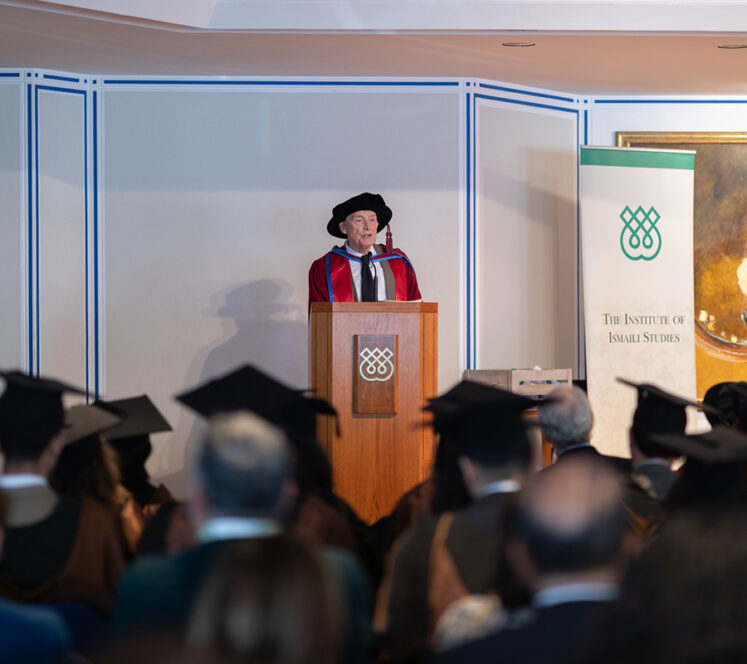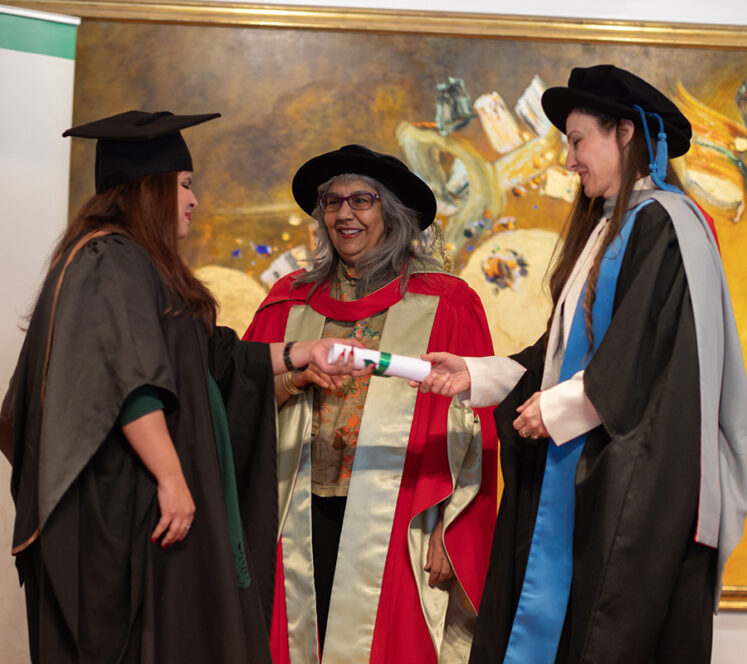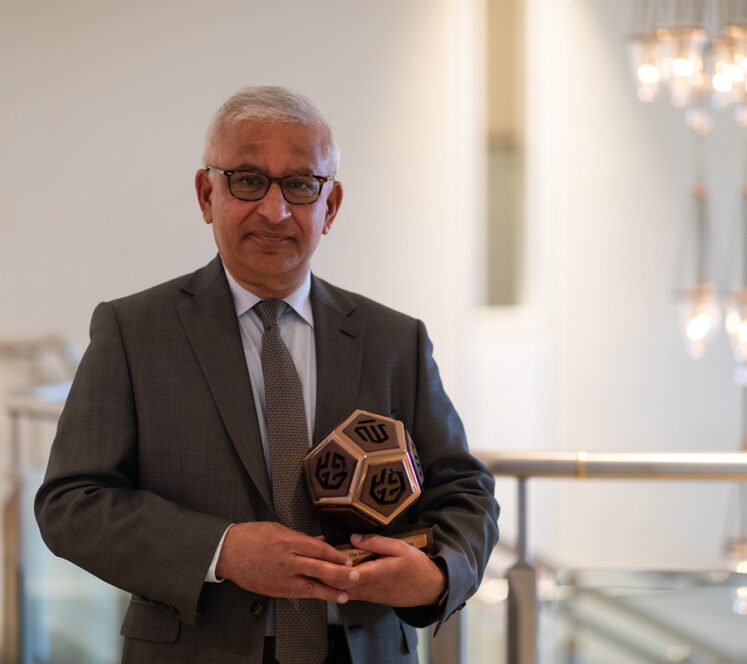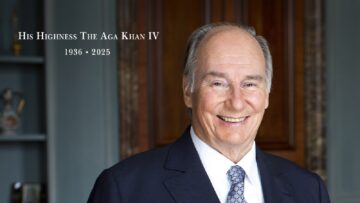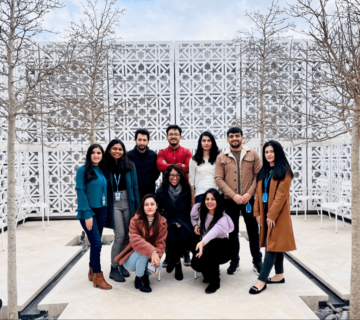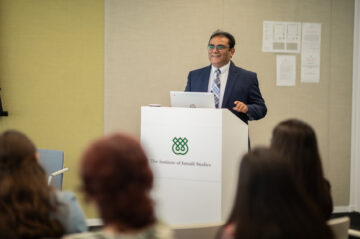Faculty, students, donors and well-wishers of the IIS came together to celebrate the graduation of STEP C14 and the GPISH class of 2023 and 2024 at the Ismaili Centre, London, on Saturday 23 March. After the graduands, their friends and families took their seats, Saad Barcha and Shamsi Naurozuv took the stage to recite Ayat al-Nur and its translation. Ayat al-Nur, the thirty-fifth verse of the Qurʾanic surah of the same name contains the phrase “light upon light! Allah guides whoever He wills to his Light” (nurun ʿala nur! Yahdi Allahu li-nurihi man yashau); the same phrase is displayed at the entrance to the students’ residence at Victoria Hall. In her speech, Professor Zayn Kassam invoked a similar sentiment, concluding:
“may you light the way for others as others have lit it for you.”
The ceremony continued with speeches by programme coordinators who all reflected on the importance of this graduating class to the ever-changing future. “You all sitting here,” Dr Laila Halani said to the graduands, “are our hope for a decent world.” Reflecting on Emily Dickenson’s “Hope” is a thing with feathers, Sophie Kerslake (UCL Institute of Education) likened the graduands to “the bird that survives the harshest of winds and rains, and still sings.” Finally, Dr Shabnum Tejani (SOAS) reiterated the importance these graduate programmes have in helping students to face the challenges of the future “with confidence, courage, and with optimism.”
In his commencement speech, Professor Gerald Hawting (SOAS) examined the importance of religious education in an increasingly secular world. “There is no doubt that for many believers and religious leaders, one of the attractions of religion is that… it offers a clear and uncomplicated way of understanding the world and the problems we constantly face,” noted Professor Hawting. “But it’s clearly not the case [that] academic study of religion necessarily endangers adherence to a religious tradition.” A sentiment that is important to remember as STEP and GPISH graduates return to their communities.
Awards
Professor Kassam and Dr Zamira Dildorbekova presented STEP cohort 14 with their awards. In a pre-recorded video, valedictorian Ali Kassem expressed his thanks to everyone who had helped him and his cohort on their shared journey. He reemphasised the importance of what they had learned in addressing the ongoing concerns of the future.
Then Professor Kassam and Dr Alex Henley presented the GPISH classes of 2023 and 2024 with their awards, followed by a speech from valedictorian Shuja Lakhani. Shuja, whose mother graduated from STEP moments earlier, reflected on the time he spent with his cohort, recounting personal anecdotes with each of his classmates, concluding: “Whether you are with your friends or your family, or your friends who have become family, I hope you can all celebrate your achievements with those you love.”
Dr David Bennett, the master of ceremonies who had been keeping the auspicious day lighthearted with his quips, then invited gratitude to all IIS staff who had helped the students along their journeys. He then introduced Dr Farhad Daftary as “the present and the future of Ismaili Studies”, who rose to a standing ovation.
Imran Khan announced the inaugural Alumni Recognition Award to Professor Karim H Karim (Carleton University) for his extensive contributions to academia and civil society. In his acceptance speech, Professor Karim extolled the intellectual tradition of the IsmailisAdherents of a branch of Shi’i Islam that considers Ismail, the eldest son of the Shi’i Imam Jaʿfar al-Ṣādiq (d. 765), as his successor. and their eternal quest for truth. He encouraged the graduands to stay true to their paths instead of taking shortcuts, despite pressure to “get the job done”. “The Institute has been part of my life, even before I came as a student, in fact before the Institute was born,” noted Professor Karim, who served as co-director of IIS for two years.
“It is a very mutually beneficial relationship I have with the IIS. I feel extremely happy and extremely grateful for this.”


